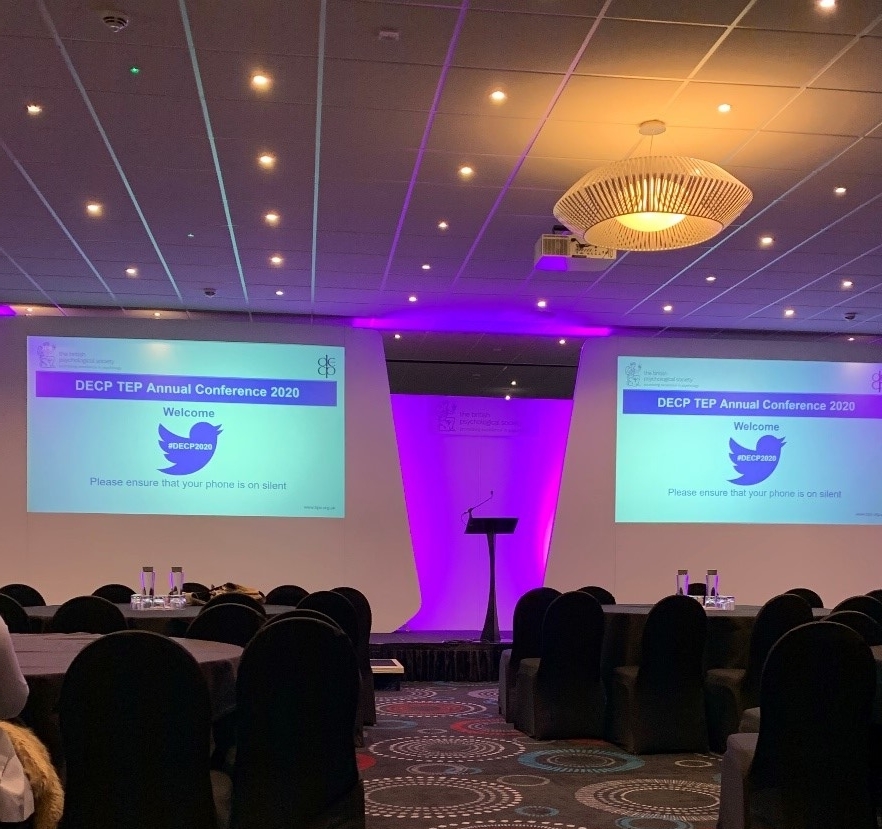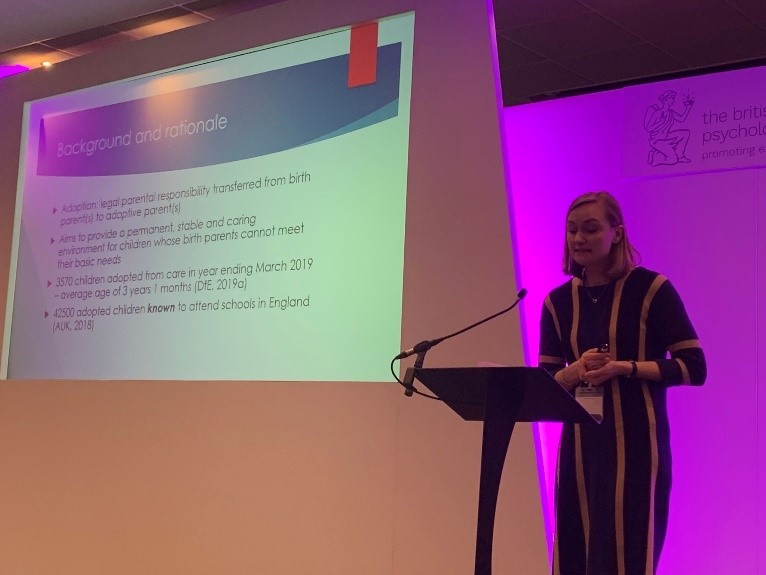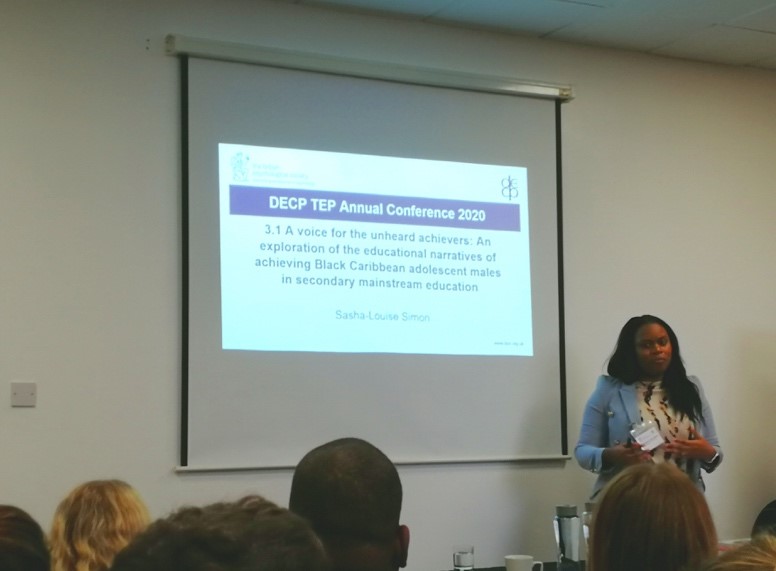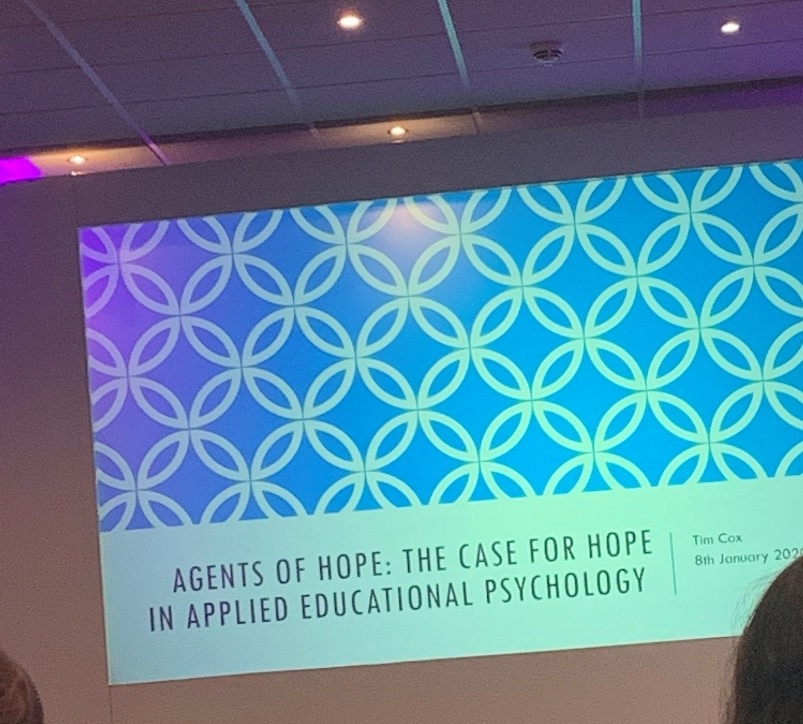By Paige Garbett and Olivia Rogers
 Last week, we had the pleasure of attending this year’s Division of Educational and Child Psychology (DECP) conference for trainee educational psychologists in Northampton.
Last week, we had the pleasure of attending this year’s Division of Educational and Child Psychology (DECP) conference for trainee educational psychologists in Northampton.
We were able to attend 6 different presentations throughout the day. The first was Dr Kathryn Morgan who trained at the University of Cardiff and presented her thesis research exploring mothers’ experiences of the Incredible Years Parents and Babies Programme and their perceptions of parenting following the programme. Kathryn’s research focused on gathering personal accounts from mothers. Her findings highlight the importance of social connectedness, feeling supported and empowered as a result of enhancing parenting knowledge and increasing feelings of confidence in parenting. The findings were further discussed in relation to broader psychological theories and concepts such as social identity theory, self-determination theory and the notion of practice-based evidence.
Dr Patricia Britto, who trained at UCL Institute of Education presented her thesis research study which explored the role metacognition plays in developing Looked After Children’s reading fluency and comprehension skills. Patricia highlighted the reading outcomes and literacy attainment gap between LAC and their peers by Key Stage 2, and the impact of Adverse Childhood Experiences upon learning for this group of children. Patricia’s findings suggest that directly teaching metacognitive processes supported reading development and increased confidence, motivation and enjoyment of reading for the children and families involved. The importance of working collaboratively with teachers, parents, carers and other professionals to support the academic attainment of Looked After Children was also raised as a key implication of the study.
Rebecca Best, who trained at the UCL Institute of Education presented her thesis  research that explored the educational experiences of adopted children and their parents. Rebecca highlighted the societal misconception that adopted children are no longer impacted by the trauma they experienced earlier in life. Rebecca’s findings indicated that adopted children and their parents shared a mixture of educational experiences relating to inner turmoil, social disconnection, unsupportive social contexts, misconceptions and prejudice, and relational repair. Rebecca used the findings to support teaching staff with raising awareness of adopted children and supporting them within education. She suggested that educational psychologists can have an important role with keeping adopted children visible within education.
research that explored the educational experiences of adopted children and their parents. Rebecca highlighted the societal misconception that adopted children are no longer impacted by the trauma they experienced earlier in life. Rebecca’s findings indicated that adopted children and their parents shared a mixture of educational experiences relating to inner turmoil, social disconnection, unsupportive social contexts, misconceptions and prejudice, and relational repair. Rebecca used the findings to support teaching staff with raising awareness of adopted children and supporting them within education. She suggested that educational psychologists can have an important role with keeping adopted children visible within education.
 It was particularly exciting to listen to a previous University of Birmingham trainee, Sasha-Louise Simon, present her doctoral research where she explored the educational narratives of achieving Black Caribbean boys in secondary mainstream education. This study aimed to shift the persistent narrative of Black Caribbean pupils as underachievers in the UK and provide a more balanced portrayal of these young people. Sasha’s narrative approach to data collection allowed for rich, detailed stories to be reported for each participant. Key themes that the boys identified as supportive were: parental expectation, peer influence, teacher involvement and support and self-reflection. The data highlighted the importance of peer group and family support more so than school for the young people. Sasha noted that educational psychologists often have specific tools available to use when working with young people and families experiencing inequality, such as person-centred and narrative approaches to consultation with key adults.
It was particularly exciting to listen to a previous University of Birmingham trainee, Sasha-Louise Simon, present her doctoral research where she explored the educational narratives of achieving Black Caribbean boys in secondary mainstream education. This study aimed to shift the persistent narrative of Black Caribbean pupils as underachievers in the UK and provide a more balanced portrayal of these young people. Sasha’s narrative approach to data collection allowed for rich, detailed stories to be reported for each participant. Key themes that the boys identified as supportive were: parental expectation, peer influence, teacher involvement and support and self-reflection. The data highlighted the importance of peer group and family support more so than school for the young people. Sasha noted that educational psychologists often have specific tools available to use when working with young people and families experiencing inequality, such as person-centred and narrative approaches to consultation with key adults.
Tim Cox, a year three trainee educational psychologist at the University of Newcastle presented his research findings relating to the concept of hope and how educational psychologists can act as “agents of hope”. Tim explored the psychological theories relating to hope which included Snyder’s Hope Theory. Tim highlighted the associations between hope and positive life outcomes and the different types of hope: good, wishful, and wilful hope. Tim shared “hope as the common ground and language of educational practice”. As educational psychologists there are frameworks and approaches that we can use in planning to encourage hope such as person centre planning.
presented his research findings relating to the concept of hope and how educational psychologists can act as “agents of hope”. Tim explored the psychological theories relating to hope which included Snyder’s Hope Theory. Tim highlighted the associations between hope and positive life outcomes and the different types of hope: good, wishful, and wilful hope. Tim shared “hope as the common ground and language of educational practice”. As educational psychologists there are frameworks and approaches that we can use in planning to encourage hope such as person centre planning.
The final session of the day was presented by Vicky Mullan and Annie McGowan, third year trainees at the University of Southampton. They presented their year 1 research which explored school professional’s views on emotionally based school avoidance. This project aimed to understand what professionals’ views were of school avoidance and how this could contribute to guidance supporting this area. Vicky and Annie used inductive analysis to identify several themes relating to the area. The findings highlighted factors school professionals felt related to school avoidance such as parental mental health, transitions from primary to secondary and social isolation. They also identified challenges such as lack of guidance and accessibility to external agencies and helpful factors such as effective multi agency working and home school relationships. This suggest educational psychologists have a role in supporting school avoidance and that school professionals value support external agencies have to offer however Vicky and Annie did highlight the need for further research into effective interventions.
We would like to say thank you to all the presenters for offering honest and authentic experiences of conducting research as part of the doctorate. It was an inspiring day that reassured us that completing the doctorate is achievable despite its challenges!
Paige is a Year 1 trainee and Olivia is a Year 2 trainee on the initial training course for educational psychologists at the University of Birmingham.
If you enjoy our blog why not follow us and you will receive an email every time we have anew post.
